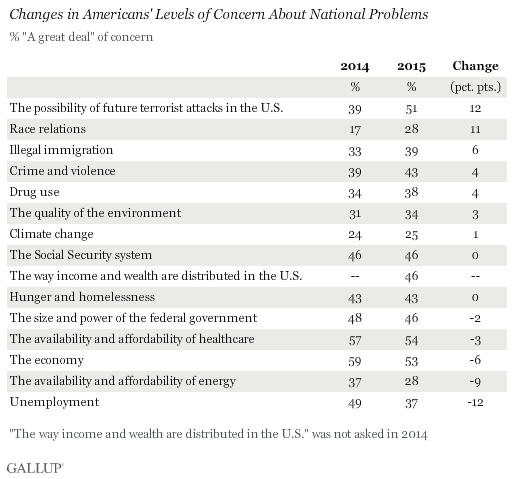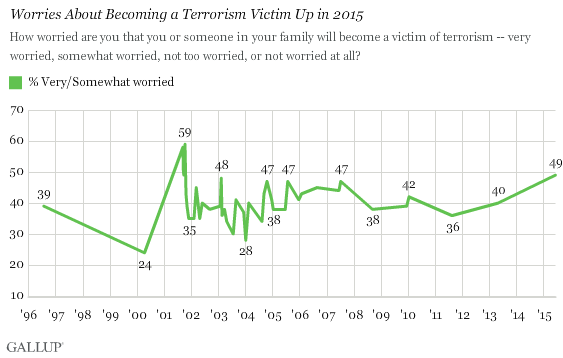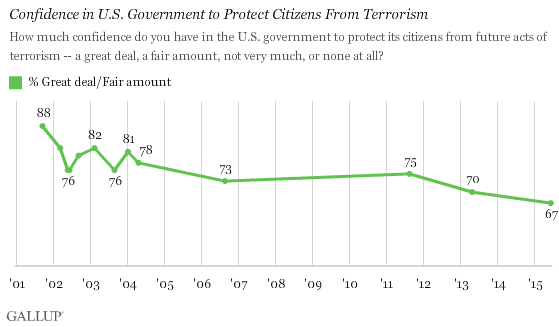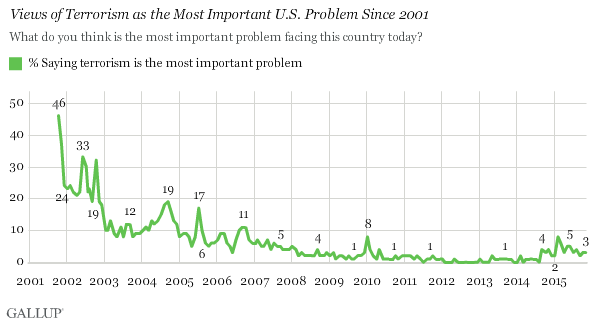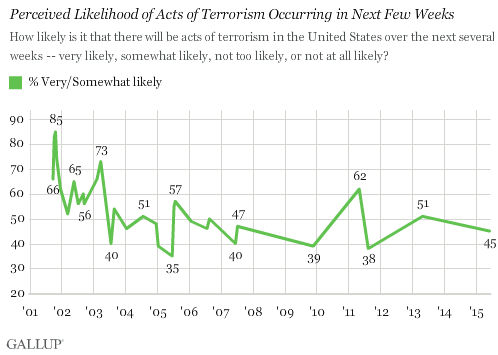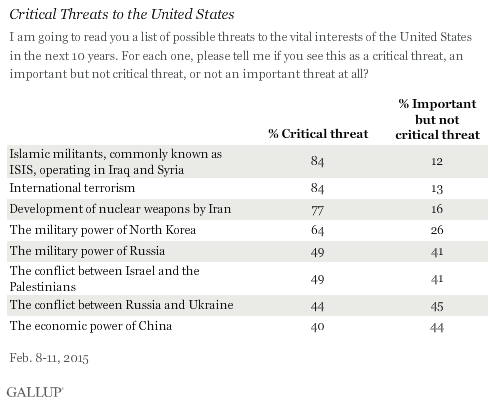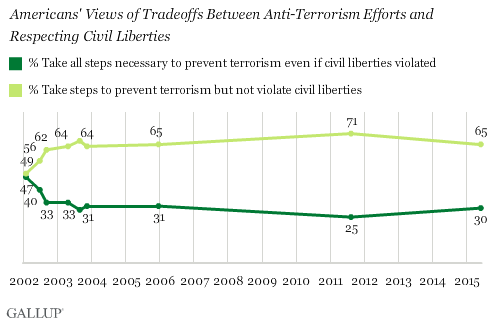By Frank Newport and Glynn Wilson –
The terrorist attacks in Paris that killed more than 120 people and wounded more than 400 put the issue of “terrorism” back at the top of the news agenda in the U.S. and moved the issue more into the consciousness of the American people, according to the latest Gallup poll on the subject.
The public’s worries about the possibility of future attacks in the U.S. rose this year by 12 percent, from 39 percent who expressed a great deal of concern in 2014 to 51 percent in 2015. Terrorism became the third-highest on the list of 15 concerns included in the list, behind only public concern for healthcare and the economy.
Worry that oneself or a member of one’s family will be a victim of terrorism has drifted up this year. Surveys show that 49 percent of Americans say they are very or somewhat worried, the highest rating since late 2001.
Americans’ confidence in the U.S. government to protect its citizens from future acts of terrorism dropped to 67 percent in June, the lowest level of trust recorded in the history of this trend begun in late 2001.
As recently as 2012, the U.S. government received a 75 percent confidence rating.
“It is possible that some of the explanation for the drop in confidence in the government to protect citizens from terrorism specifically is the overall drop in Americans’ confidence in the government in general,” Gallup says.
Earlier in 2015, 59 percent of Americans said they were satisfied with the nation’s security from terrorism, which was down from readings taken in 2012, 2013 and 2014 — but close to attitudes in the 2005 through 2008 time period.
Only 3 percent of Americans mentioned terrorism as the most important problem facing the nation in Gallup’s most recent survey.
This percentage has varied over the past 14 years, after reaching a high of 46 percent in October 2001 after the 9/11 terrorist attacks in New York City and Washington, D.C. Terrorism mentions jumped up at times in 2004 and 2005, fell again, and then rose in January 2010 after a terrorist in an airplane over Detroit failed to detonate a bomb. In February of this year, 8 percent mentioned terrorism after the Charlie Hebdo tragedy and deaths of Western citizens held hostage by Islamic State militants, but within months this had fallen back down to its present level.
In addition to mentions of terrorism, small percentages of Americans in November’s most important problem question mentioned national security and international issues.
Earlier this year a little less than half of Americans said it was very or somewhat likely that there would be a terrorist attack in the U.S. within the next few weeks. That percentage was down from a reading of 51 percent taken after the Boston Marathon bombing in 2013 and 62 percent in early 2011 after the killing of Osama bin Laden in Pakistan by U.S. forces. Prior to that there were numerous times when a majority of Americans said it was very or somewhat likely that there was going to be an attack, including 85 percent in late 2001 and 73 percent in early 2003.
By February of this year, Americans had come to the point where ISIS and international terrorism were more likely to be seen as critical threats to the vital interests of the United States than any others on a list of eight possible threats. Perceptions of ISIS as a top critical threat were higher than the development of nuclear weapons by Iran and the military power of North Korea.
One key issue in public opinion about terrorism is the question of what Americans think should be done to prevent it. CIA Director John Brennan on Monday stated that the civil liberties protections on surveillance put in place after the Edward Snowden revelations were hampering the nation’s ability to track down and find terrorists.
“Americans, however, have in recent years come down by a two-to-one margin in favor of the U.S. taking steps to prevent terrorism that do not violate civil liberties, as opposed to taking all steps necessary to prevent terrorism even if civil liberties are violated,” Gallup data shows. “This type of sentiment has been measured going all the way back to 2002, although in the early months of that year the division between the two parts of this trade-off question was much closer.”
An early November survey found that 43 percent of Americans favored the U.S. “sending ground troops to Iraq and Syria in order to assist groups in those countries that are fighting the Islamic militants,” while 53 percent were opposed to ground forces. This was roughly the same as 2014.
This measure came before the Paris attacks, but after President Barack Obama had announced he was sending 50 special operations troops to Syria to help fight ISIS.
The president said on Monday that he was opposed to sending more troops to fight ISIS in retaliation for the attacks, “but the issue will no doubt continue to be discussed in the weeks ahead,” Gallup says.
There is initial evidence of a small rally effect in President Obama’s overall job approval rating in the days after the Paris attacks. Obama’s approval averaged 51 percent Friday through Sunday, compared with 47 percent in the three days prior to Friday.
“This is not a large increase,” Gallup says, “but certainly fits the pattern observed in previous years when a threat to the U.S. resulted in a jump in the president’s approval rating.”
Examples include a 35-point jump after the 9/11 attacks, the largest such increase on record, a seven-point jump after Osama bin Laden was found and killed in 2011 and a four-point increase after the bombing of Marine barracks in Lebanon that resulted in the deaths of 241 U.S. servicemen in 1983.


